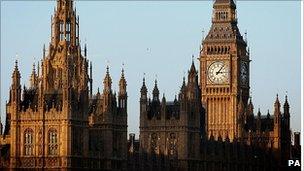How former MPs are adjusting to life outside Parliament
- Published

Some MPs miss Parliament more than others
Parliament saw its largest exodus of MPs in modern times last year, with nearly 150 members standing down at the election. What is life like after Westminster? Gavin Stamp reports.
While all those who departed the Commons last April will always have one thing in common, the paths they have trodden since then have been very different.
Nearly 30 have been awarded peerages - including former Tory leader Michael Howard and former Deputy Prime Minister John Prescott - so swapping one parliamentary chamber for another.
Indeed, the number of ex-Labour MPs in the Lords has become a political issue in itself, with the coalition accusing them of ganging together to thwart plans to redraw parliamentary constituencies.
For some of those MPs no longer actively involved in politics, the decision to leave the House of Commons was a pretty straightforward one and they harbour few regrets.
Free time
While admitting to some "withdrawal symptoms" at being a bystander on election night, former Conservative MP Ian Taylor says he was always sure it was the right decision to stand down after 23 years representing Esher and Walton.
"I did not leave with any sense of disillusionment," he says. "I left because I felt, being 65-years-old, if I was going to do something else, now was the time when I had bags of energy."
What struck him immediately about post-Westminster life was the amount of time he had on his hands, and the sense of freedom.
He speaks about the "sense of bafflement" he felt about going to a play in London on a Saturday afternoon - a time when he would normally have been in his constituency.
"Getting your diary back in your own hands is initially bewildering and then exhilarating."
For those MPs who actually fought the election and went down to defeat, the thrill of having so much time on their hands may have been less intoxicating.
Lib Dem Lembit Opik, who saw his 7,000 majority overturned in one of last year's shock results, described losing his seat as the equivalent of an earthquake.
'Defying gravity'
One vanquished Labour MP says he had come to terms with the possibility of defeat in the run-up to the election and said this eased the pain.
"I was a Labour MP for a seat that had always been Conservative, so I was always aware that I was defying gravity and it wouldn't last forever," says Nick Palmer, who lost the seat of Broxtowe in Nottinghamshire after 13 years as its MP.
Like anyone taking a new step in life, it helps to have a plan - or at least an idea - of what to do next and the experiences of former MPs seem to bear this out.
"I did not leave the House to learn what to do," says Ian Taylor, who is pursuing a number of business ventures. "I knew what I wanted to do. I made a very clear mental break in that sense."
While missing the friendships he made in Parliament, he says he is glad to have left behind the routine of parliamentary life.
Some former MPs have, ironically, found themselves with arguably more influence in their new roles than if they had remained in Parliament.
Lib Dem Julia Goldsworthy was probably expecting to have a reasonably high profile as a Lib Dem spokesman during the current parliament.
But she lost her seat - but is now closer to the heart of government than she probably ever expected, as special adviser to Treasury Chief Secretary Danny Alexander.
However, there will always be some advantages MPs have that cannot be replicated beyond Westminster - such as the ability to open doors.
"I miss the direct access to ministers," says Nick Palmer, who is now director of corporate affairs for BUAV - which campaigns against experiments on animals.
"The ability to solve constituents' problems directly simply by ringing the source of the problem and gently indicating that 'the MP is taking an interest and might escalate it'."
'Endless hours'
Some former MPs have relished turning their backs on politics and carving out a new career, Ann Widdecombe being the most obvious.
But others, including Nick Palmer, hope that the next few years will be an interregnum rather than an end to their political ambitions.
The ex-Labour MP hopes to stand for Parliament again but admits there are many things about Westminster he could gladly leave behind.
"I don't miss the bear garden of Prime Minister's Questions or the endless hours sitting in the Chamber waiting to try to get a few minutes talking to an empty House.
"Politics in Britain mainly works through private conversations with the decision-makers and speeches in routine debate have a "going through the motions" feel".
- Published5 December 2010
- Published11 July 2010
- Published20 June 2010
- Published22 June 2010